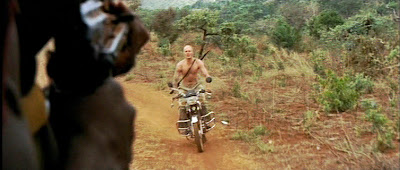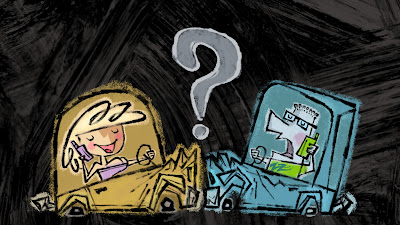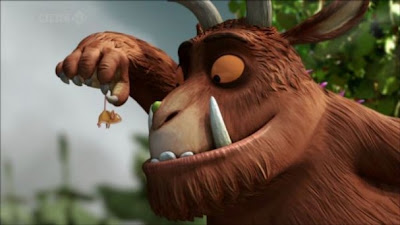 |
| Lesley Manville Another Year |
Few of us had much opportunity to see these great films. Producers, with their convoluted distribution methods, haphazardly release so many good films,with such minimal promotion and screen time, that even the most dedicated cinephiles have to be quick and aware to catch these movies.
So every year MLB turns the spotlight on those few films, those standouts, that are just as good, if not better, than any Academy Award nominee movies that have garnered critical raves and boast terrific performances; movies that, for reasons even marketing gurus can't explain, you never got a chance to see.
And keep in mind, studios relegate January through April for dumping their worst, lowest end movies. So seeking out these neglected gems is a better bet than patronizing new releases.
For a chance to see them on the big screen, second run theaters
are the way to go. Or go the DVD route.
For a chance to see them on the big screen, second run theaters
are the way to go. Or go the DVD route.
Either way, don't, don't miss them.
 |
| Ed Harris The Way Back |
ANOTHER YEAR: MIKE LEIGH
British filmmaker Mike Leigh makes movies that can only be described as closely observed and honest, creating a world that reflects people in normal circumstances -- good, bad, caring, indifferent. He creates real and unique characters that, conventional though they may be, come off as almost enchanting. He is known for shaping scripts from the improvisations of his cast, allowing them to inhabit the people they play. And it works. Leigh's characters are as authentic as your neighbors, or, just as likely, you and me.
I measure his success based on his superb last film, Happy- Go- Lucky (2008). It was about a constantly happy school teacher who's perpetual optimism is too loud, too much, and annoying to everyone. It had a knock-your-socks-off performance by Sally Hawkins -- so good that all these years later she's still in my mind.
 |
| Lesley Manville |
So I was pleasantly shocked to see Leigh not only direct another virtuoso performance from an actress in Another Year, but make a movie just as good as his last. Lesley Manville is nuanced, rich, and most importantly, not maudlin as Mary, a lonely, yearning, over-drinking middle-age woman. At first you like her, then, as she can't help but publicly cultivate her private pain, becomes a nuisance. The power in her performance comes from how uneasy she makes you feel while pulling at you with an affect that's almost attractive. She elicits a gut reaction of empathy you can't quite believe. I thought Manville's performance topped all of Oscar's 2010 best actress nominees. She wasn't even nominated.
The movie is about the doings of a middle age couple Tom and Gerri (Jim Broadbent and Ruth Sheen) through the course of one year. They're happy, make fun of their cartoon character names, have people over for dinner, and garden; like many couples you know. Leigh stages scene after scene of their regular lives -- work, family, kitchen conversations -- and the magic comes in how he connects you with each character through everyday events. Love them, shocked by them, desire to be like them, whatever you feel, as in Happy-Go-Lucky, you'll come away remembering and caring for them all.
THE WAY BACK: PETER WEIR
Seeing The American starring George Clooney last year, I thought 'how wonderful:" this movie so effectively recreated those Jean Pierre Melville tough guy movies from the sixties, so accurately captured that sang-froid, smooth veneer, it offered the opportunity for current generations, who have never seen these kind of movies, to discover this genre. The Way Back does the same for that bygone era of David Lean wide vista, classic adventure sagas.
Set in 1940, a hard-wired gang of Gulag prisoner-of-war escapees cross thousands of miles of desert, mountains, and forests in Siberia, India, and China trying not only to reach freedom, but to wrest the future of their own lives from those governing forces beyond their control, both natural and political. It's an arresting and detailed depiction of the journey. In one superbly composed and edited sequence, master cinematographer Russell Boyd creates a palpable feel for the gritty rawness of wind and sand as the group runs for cover in advance of a sandstorm. It had me ducking, an experience I haven't had at the movies in a long time. Cold and wet, hungry and thirsty, slogging through the boring and brutal, and most of all, ratcheting up the cruel energy and exhilaration necessary in the hard struggle to survive, is what this movie is about.
 Those who have criticized the film's characters for being remote, estranged even, have missed the point. Here action is character, and Ed Harris stands out as the restrained,wise, knowing-life-is-unfair stoic. He carries our eyes and minds through this struggle of trying to stay human in an inhumane world.
Those who have criticized the film's characters for being remote, estranged even, have missed the point. Here action is character, and Ed Harris stands out as the restrained,wise, knowing-life-is-unfair stoic. He carries our eyes and minds through this struggle of trying to stay human in an inhumane world.
This is Peter Weir's first film since his exhilarating Master and Commander in 2003. After making the film festival rounds in the fall of 2010, and garnering critical raves and good word of mouth, The Way Back was dumped into general theaters by distributor Newmarket in January 2011 without so much as a word of promotion. Nothing could overcome that deficiency, so it was no surprise when the movie didn't attract an audience and Newmarket pulled it immediately. Hopefully it'll find new life in second run theaters before ending up on DVD and Netflix.
WHITE MATERIAL: CLAIRE DENIS
At age 58, French icon Isabelle Huppert continues to offer audiences more intimacy and energy than actresses half her age (check her out in Michael Haneke's film The Piano Teacher). She embodies her roles like no one else I can think of, expressing through body movement, face, and eyes what her character feels and thinks -- and what action she's going take next. Her natural sixth sense of physical communication, like all the best actresses, transcends dialogue.
In White Material, Huppert's corporal aesthetic matches the boldly physical, fluid action sequences that characterize French director Claire Denis. Huppert plays Maria,who runs a coffee plantation in an unnamed African country in an unknown time, who is fearlessly trying to get her crop in during an armed and bloody revolution. Sure, the movie has a message about white colonials exploiting African nations, but Denis (who was raised in French colonized Senegal and Cameroon) is after so much more.
Maria, who can't stop her employees, frightened of the hard-edged cruelty practiced by both sides, from fleeing the plantation to seek safety, sets off on an individual journey to find the labor, trucks, and help she needs to harvest the coffee. Everyone is against her; they tell her she should leave for her own safety, but she won't, she can't. Even though the revolution has over-turned the former power structure and she is no longer top dog, this is her home, she has no where else to go.
The photo still above is just one example of how Denis visually uses Huppert's physical acting to portray this conflict: Maria, in the middle of her plantation, is searching; a road going nowhere, somewhere? The land is dry, the road is dusty, the crop is drying out. Sundress blowing in the warm breeze, with that diminutive, girlish figure, she's certainly a vulnerable target. But her shoulders are strong and firm and the stance is determined, confrontational. The people she has lived with and hired, knows as colleagues and friends, are now against her, and she has no idea why. She's not with the other whites, not a part of those exploitive white colonials.
Who is she then? Maria's myopic point of view is almost delusional. But Denis pulls us along with this not so likable heroine who's disconnected from the people of her country. Maria could be a just a conventional movie representative of the evils of colonization, but Denis makes it personal, as if we're part of this, which we are.
BLUE VALENTINE: DEREK CIANFRANCE
Blue Valentine is more than a candid story of a dissolving marriage; it's about the end of a love. A blue collar married couple, Cindy (Michelle Williams) and Dean (Ryan Gosling), both caring parents, reach the point they can no longer be together, or remember how they ever became a couple in the first place. There are lots of reasons how they came to this, but neither could actually explain the how or why. Starting off where most movies end, when that "happily ever after" glow has disappeared and life happens to love, these two are fighting a battle neither can win.
Writer-director Cianfrance's screenplay doesn't take sides or cast blame. There's no moral lesson here. When Cindy and Dean fight in the office where Cindy works, the gritty and frightening reality to all the screaming and chaos makes you squirm and feel embarrassed -- then moves to where you feel empathy for both characters. In my favorite scene, Cindy and Dean have a discussion-fight driving to a hotel room in a vain attempt to spice up their marriage. Shot from the back seat, speaking to the other one shot at a time, like they're talking to thin air, they talk about Cindy's old boyfriend. Why did she bring him up? Why is he jealous? These two are so distant that even as they try to be together and loving, everything they say creates more fear and mistrust.
What raises this movie above the level of a kitchen-sink soap opera is the candid writing, the visual, open-to-both sides directing, and the remarkable intimacy and intensity of the acting. Cianfrance is said to have had Williams and Gosling live together for two weeks before filming started. If so, it certainly shows on the screen. But to focus on Williams because she was a best actress Oscar nominee is to short change Gosling. He became hugely famous years back for that kissing-in-the-rain scene from The Notebook (see blog "Kissin' in the Rain" from Feb. 2010); but here, as a working class husband and father overwhelmed by life's changes, who doesn't know how or why he's losing his wife, and feels impotent about what to do, he matches Williams scene for scene. The movie wouldn't work if he didn't. You believe they are a real couple.
Set in 1940, a hard-wired gang of Gulag prisoner-of-war escapees cross thousands of miles of desert, mountains, and forests in Siberia, India, and China trying not only to reach freedom, but to wrest the future of their own lives from those governing forces beyond their control, both natural and political. It's an arresting and detailed depiction of the journey. In one superbly composed and edited sequence, master cinematographer Russell Boyd creates a palpable feel for the gritty rawness of wind and sand as the group runs for cover in advance of a sandstorm. It had me ducking, an experience I haven't had at the movies in a long time. Cold and wet, hungry and thirsty, slogging through the boring and brutal, and most of all, ratcheting up the cruel energy and exhilaration necessary in the hard struggle to survive, is what this movie is about.
 Those who have criticized the film's characters for being remote, estranged even, have missed the point. Here action is character, and Ed Harris stands out as the restrained,wise, knowing-life-is-unfair stoic. He carries our eyes and minds through this struggle of trying to stay human in an inhumane world.
Those who have criticized the film's characters for being remote, estranged even, have missed the point. Here action is character, and Ed Harris stands out as the restrained,wise, knowing-life-is-unfair stoic. He carries our eyes and minds through this struggle of trying to stay human in an inhumane world.This is Peter Weir's first film since his exhilarating Master and Commander in 2003. After making the film festival rounds in the fall of 2010, and garnering critical raves and good word of mouth, The Way Back was dumped into general theaters by distributor Newmarket in January 2011 without so much as a word of promotion. Nothing could overcome that deficiency, so it was no surprise when the movie didn't attract an audience and Newmarket pulled it immediately. Hopefully it'll find new life in second run theaters before ending up on DVD and Netflix.
WHITE MATERIAL: CLAIRE DENIS
At age 58, French icon Isabelle Huppert continues to offer audiences more intimacy and energy than actresses half her age (check her out in Michael Haneke's film The Piano Teacher). She embodies her roles like no one else I can think of, expressing through body movement, face, and eyes what her character feels and thinks -- and what action she's going take next. Her natural sixth sense of physical communication, like all the best actresses, transcends dialogue.
In White Material, Huppert's corporal aesthetic matches the boldly physical, fluid action sequences that characterize French director Claire Denis. Huppert plays Maria,who runs a coffee plantation in an unnamed African country in an unknown time, who is fearlessly trying to get her crop in during an armed and bloody revolution. Sure, the movie has a message about white colonials exploiting African nations, but Denis (who was raised in French colonized Senegal and Cameroon) is after so much more.
 |
| Isabelle Huppert: Vulnerable yet Determined in White Material |
The photo still above is just one example of how Denis visually uses Huppert's physical acting to portray this conflict: Maria, in the middle of her plantation, is searching; a road going nowhere, somewhere? The land is dry, the road is dusty, the crop is drying out. Sundress blowing in the warm breeze, with that diminutive, girlish figure, she's certainly a vulnerable target. But her shoulders are strong and firm and the stance is determined, confrontational. The people she has lived with and hired, knows as colleagues and friends, are now against her, and she has no idea why. She's not with the other whites, not a part of those exploitive white colonials.
Who is she then? Maria's myopic point of view is almost delusional. But Denis pulls us along with this not so likable heroine who's disconnected from the people of her country. Maria could be a just a conventional movie representative of the evils of colonization, but Denis makes it personal, as if we're part of this, which we are.
BLUE VALENTINE: DEREK CIANFRANCE
Blue Valentine is more than a candid story of a dissolving marriage; it's about the end of a love. A blue collar married couple, Cindy (Michelle Williams) and Dean (Ryan Gosling), both caring parents, reach the point they can no longer be together, or remember how they ever became a couple in the first place. There are lots of reasons how they came to this, but neither could actually explain the how or why. Starting off where most movies end, when that "happily ever after" glow has disappeared and life happens to love, these two are fighting a battle neither can win.
Writer-director Cianfrance's screenplay doesn't take sides or cast blame. There's no moral lesson here. When Cindy and Dean fight in the office where Cindy works, the gritty and frightening reality to all the screaming and chaos makes you squirm and feel embarrassed -- then moves to where you feel empathy for both characters. In my favorite scene, Cindy and Dean have a discussion-fight driving to a hotel room in a vain attempt to spice up their marriage. Shot from the back seat, speaking to the other one shot at a time, like they're talking to thin air, they talk about Cindy's old boyfriend. Why did she bring him up? Why is he jealous? These two are so distant that even as they try to be together and loving, everything they say creates more fear and mistrust.
What raises this movie above the level of a kitchen-sink soap opera is the candid writing, the visual, open-to-both sides directing, and the remarkable intimacy and intensity of the acting. Cianfrance is said to have had Williams and Gosling live together for two weeks before filming started. If so, it certainly shows on the screen. But to focus on Williams because she was a best actress Oscar nominee is to short change Gosling. He became hugely famous years back for that kissing-in-the-rain scene from The Notebook (see blog "Kissin' in the Rain" from Feb. 2010); but here, as a working class husband and father overwhelmed by life's changes, who doesn't know how or why he's losing his wife, and feels impotent about what to do, he matches Williams scene for scene. The movie wouldn't work if he didn't. You believe they are a real couple.



















